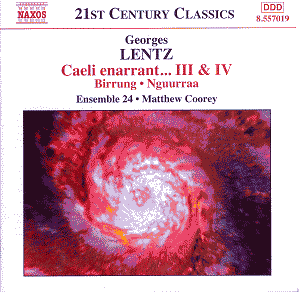"Godís ways are impenetrable", as the saying
goes (at least, in French), and one might add that recording companiesí
ways are often as impenetrable as the Lordís. With three recordings
of his music released over the last few years and with the present disc,
Georges Lentzís complete current published output is now available in
commercial recordings. I hasten to say that there is nothing wrong with
this, for Lentzís music is well worth having and repays repeated hearings.
His output, so far, consists of several works, all
parts of his ongoing cycle Caeli enarrant... of which
the second and sixth panels are still works-in-progress; and are, to
the best of my knowledge, still unfinished at the time of writing. The
collective title of the cycle comes from Psalm XIX and reflects the
composerís interest in astronomy as well as his religious concerns,
though Lentz is no Messiaen, in that he often questions some religious
dogmas. A section from Caeli enarrant...IV is titled Te
Deum Laudamus (it is also available as a short piece for string
orchestra) though the composer keeps asking if "it does make sense
to praise God while the TV is showing pictures of Iraq, Rwanda, the
Balkans and the Middle East". So, no saintliness here, but a contemporary
manís meditation and questioning of life and death, the present world
and (maybe) the hereafter. There is, however, nothing narrowly parochial
in Lentzís music either, even if it has moments suggesting the timelessness
of plainchant as in the end of Caeli enarrant...III or
that of Caeli enarrant...IV.
In total contrast to the first panel (available on
LGNMís Anthologie de musique luxembourgeoise Ė Volume 5 review
) scored for large orchestra, Caeli enarrant...III
is sparsely scored for a small string orchestra, percussion and a boy
soprano (in the beautiful, hymn-like third movement), and is on the
whole more austerely meditative though it has its weightier episodes.
Caeli enarrant...IV, for string quartet and four cymbals,
moves in still more rarefied air though it too has some louder episodes.
It opens with a tense, arresting gesture (the four strings, as it were,
trying to find their way out of the forcefully reiterated central note
on which the whole work is centred). The music, in spite of many long,
expectant pauses and thinly scored passages, progressively gains momentum
before eventually reaching its ethereal conclusion.
Mysterium (or Caeli enarrant...VII),
apparently, is the final instalment of a cycle of which four panels
have been completed so far. Ngangkar and Guyuhmgan
(both for orchestra) are available on ABC CLASSICS 472 397-2 reviewed
in September 2002, and the two panels recorded here, Birrung
(Aboriginal word for "star") for small string orchestra and
Nguurraa ("Light") for clarinet, violin, cello,
piano and percussion. Birrung and Nguurraa
are both predominantly contemplative pieces in much the same way as
the orchestral panels of Mysterium. Their instrumental
settings, however, enhance the meditative mood of most of the music,
particularly so in the beautiful Birrung, a short movement
of ecstatic beauty.
Lentzís quantitatively few but qualitatively high output
is the expression of an honest and sincere creativity reflecting deeply
personal experience. Lentzís voice is definitely distinctive - one to
be reckoned with. The present performances serve the music well. I enjoyed
Cooreyís urgent reading of the often austere Caeli enarrant...IV
(an earlier recording on TALL POPPIES TP 035 with the composer as one
of the violins plays for an extra four minutes). Warmly recommended.
Hubert Culot

